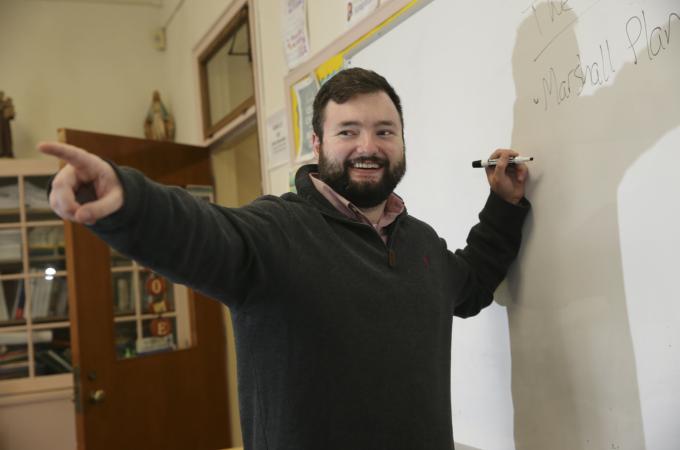Forming the Future: Cambridge Matignon School embraces experiential learning
CAMBRIDGE -- Experience may be the best teacher at the Cambridge Matignon School, where students employ problem-based learning and have opportunities for independent research and internships, bridging the gap between classroom learning and real-world application.
Over the past few years, the school has been moving toward experiential learning as its driving philosophy, according to Greg Salvucci, the director of experiential learning at Cambridge Matignon School. He said he thinks it fits with the school's overall mission.
"Our pedagogical mission is to provide students with the skills necessary to thrive in a 21st-century world. That world rewards the abilities to think critically, to collaborate, to innovate. Those are skills that experiential learning highlights, that it strives to better in all students," Salvucci said in a May 13 interview.
In 2019, the school, formerly called Matignon High School, formed a partnership with Northeastern University, a leader in experiential learning. They held a series of professional development workshops about project-based learning, and some of the teachers took a master's course in experiential learning.
"This has been kind of a defining feature of our professional development for teachers, and it's been working its way into classrooms and different things students have been doing," Salvucci said.
Juniors and seniors at Cambridge Matignon School have the option of taking an experiential learning seminar. Typically, Salvucci gives each grade a presentation on this opportunity, and students come to him to discuss their interests and ideas for projects.
The onset of the coronavirus pandemic backtracked the school's plans for experiential learning, particularly in terms of allowing students to go off-campus. But even while using remote or hybrid learning, students have still found ways to do research related to their interests. Some have done informational interviews with professionals in the fields they want to enter, such as finance or health care.
"Sometimes we can think of this as an extra program, but it's actually becoming an integral part of who we are as a school," Salvucci said.
The way they see experiential learning in classrooms, he said, is through project-based learning, which he defined as "basically learning by doing."
Social studies teacher Liam MacDonald has seen the benefits of experiential learning among his own students.
"Through experiential learning, you're able to have a lot of choice and voice in what kind of learning you want to do and how you want to get there," he said in a May 17 interview.
He said it has allowed him to get to know his students better, and enabled them to work on skill development rather than "the rote memorization that history can turn into."
This year, for example, MacDonald had his freshman students write and record podcasts on different topics. To compete in National History Day, some of his American history students made a documentary about immigration in their home communities, while another group researched discrepancies and inequities in Massachusetts public school budgets.
MacDonald said he thinks experiential learning speaks to "what Catholic education should be about, which is creating experiences that reflect students' desires not just to be better learners but to be better and more moral people."
Dylan Griffith, a senior on track for Dartmouth College, has felt the positive effects of experiential learning in multiple ways during his time at Cambridge Matignon School. He not only participated in the seminar but also learned a great deal through his extracurricular activities, including his participation in the student council, the mock trial team, and other student groups.
He has always been interested in politics, so for his seminar, he worked in Senator Ed Markey's campaign. Dylan said this was "an eye-opening experience" that helped him learn about different issues and the workings of local politics.
"I would say that mock trial and working on the campaign were the most beneficial experientially for me, because I learned so much about political and legal systems through those two that I would not have learned about in a class," he said.
Dylan has also interned in the school's communications office. He and other members of the Entrepreneurship Club helped the school examine its marketing and advertising strategies, particularly with regard to the school's website. Their recommendations to the administration played into the school's rebranding over the past year, which included changing its name to reflect its home in Cambridge, an area known for its academic institutions.
"It seems like you need more education and more experience earlier and earlier for the current world that we live in, and I think it's a good thing that the school is refocusing and shifting the learning model to adapt to the times that we're in," Dylan said.



















